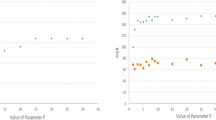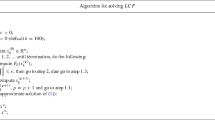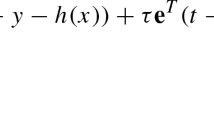Abstract
Several methods for solving the nonlinear complementarity problem (NCP) are developed. These methods are generalizations of the recently proposed algorithms of Mangasarian and Solodov (Ref. 1) and are based on an unconstrianed minimization formulation of the nonlinear complementarity problem. It is shown that, under certain assumptions, any stationary point of the unconstrained objective function is already a solution of NCP. In particulr, these assumptions are satisfied by the mangasarian and Soolodov implicit Lagranian functioin. Furthermore, a special Newton-type method is suggested, and conditions for its local quadratic convergence are given. Finally, some preliminary numerical results are presented.
Similar content being viewed by others
References
Mangasarian, O. L., andSolodov, J. V.,Nonlinear Complementarity as Unconstrianed and Constrianed Minimization Mathematical Programming, Vol 62B, pp. 277–297, 1993.
Harker, P. T., andPang, J. S.,Finite-Dimensional Variational Inequality and Nonlinear Complementarity Problems: A Survey of Thery, Alkgorithms, and Applications, Mathematical Programming, Vol. 48B, pp. 161–220, 1990.
Pang, J. S.,A B-Differentiable Equation-Based, Globally Locally Quadratically Convergent Algorithm for Nonlinear Programs, Complementary, and Variational Inequality Problems, Mathematical Programming, Vol. 51A, pp. 101–131. 1990.
Harker, P.T., andXiao, B.,Newton's Methods for the Nonlinear Complementarity Problem: A B-Differentialbe Equation Approach, Mathematical Programming, Vol. 48B, pp. 339–357, 1990.
Mangasarian, O. L.,Equivalence of the Complementarity Problem to a System of Nonlinear Equations, SIAM Journal on Applied Mathematics, Vol. 31, pp. 89–92, 1976.
Kanzow, C. Some Equation-Based Methods for the Nonlinear Complementarity Problem, Optimization Methods and Software, Vol. 3, pp. 327–340, 1994.
Subramanian, P. K.,Gauss-Newton Methods for the Complementarity Problem, Journal of Optimization Theory and Applications, Vol. 77, pp. 467–482, 1993.
Murty, K. G.,Linear Complementarity, Linear and Nonlinear Programming, Heldermann Verlag, Berlin, Germany, 1988.
Cottle, R. W., Pang, J. S., andStone, R. E.,The Linear Complementarity Problem, Academic Press, Boston, Massachusetts, 1992.
Kanzow, C., andKleimichel, H.,A Class of Newton-Type Methods for Equality and Inequality Constrained Optimization, Optimization Methods and Software Vol. 5, pp. 173–198, 1995.
Fischer, A.,A Special Newton-Type Optimization Method, Optimizatiion, Vol. 24, pp.269–284, 1992.
Yamashita, N., andFukushima, M.,On Stationary Points of the Implicit Lagrangian for Nonlinear complementary Problems, Journal of Optimization Theory and Applications, Vol. 84, pp. 653–663, 1995.
Gill, P. E., Murray, W., andWright, M. H.,Practical Optimization, Academic Press, London, England, 1981.
Hock, W., andSchittkowski, K.,Test Examples for Nonlinear Programming Codes, Lecture Notes in Economics and Mathematical Systems, Springer Verlag, Berlin, Germany, Vol. 187, 1981.
Author information
Authors and Affiliations
Additional information
Communicated by P. Tseng
The author would like to thank Dr. Oswald Knoth (Leipzig) for pointing out that the equivalence of Lemma 2.2. is not true for complementarity problems which have no solutions. He is also grateful to the anonymous referencees for their helpful comments.
Rights and permissions
About this article
Cite this article
Kanzow, C. Nonlinear complementarity as unconstrained optimization. J Optim Theory Appl 88, 139–155 (1996). https://doi.org/10.1007/BF02192026
Issue Date:
DOI: https://doi.org/10.1007/BF02192026




